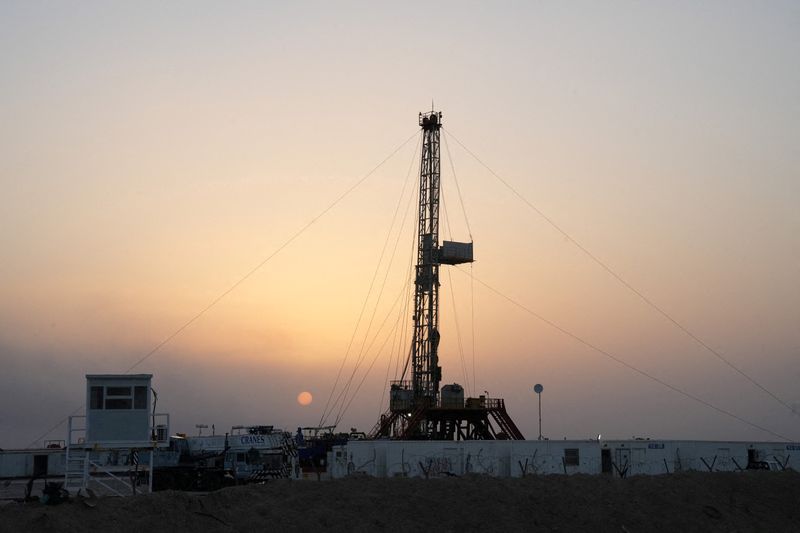By Rowena Edwards, Maha El Dahan and Ahmed Rasheed
LONDON (Reuters) - Iraq's oil output and capacity may peak following growth of around 25% over the next five years, analysts said, falling short of 2027 targets and ending a long-standing ambition to rival the output of top OPEC producer Saudi Arabia.
Political infighting has cost Iraq the opportunity to invest in growing output more quickly. As the energy transition gathers pace, it means Baghdad may never be able to cash in the hundreds of billions of barrels it has in the ground, even with the efforts of the country's new energy minister to attract investment.
Since 2016, Iraq's output has stalled at around 4.5 million barrels per day (bpd).
Before then, capacity grew rapidly as the government opened up the sector in 2009 and international oil companies revamped the country's biggest oilfields.
GRAPHIC: Iraq's annual average crude oil production- https://www.reuters.com/graphics/OIL-IRAQ/OPEC/znpnbljrjpl/chart.png
Growth slowed in part because Iraq agreed to cap output under supply policy agreed with the Organization of the Petroleum Exporting Countries (OPEC) and allies, a group known as OPEC+.
Iraq's Oil Minister Hayan Abdel-Ghani, who took office in October, plans to update Iraq's oil production strategies to meet local needs while complying with the OPEC+ agreement, oil ministry spokesman Asim Jihad told Reuters.
It is too early for the new government to talk about any significant increases in Iraq's oil production outside the OPEC+ agreement, Jihad said. Under the agreement, Iraq's production target is 4.43 million bpd until December.
As a result, Iraq has shifted focus to the refining and gas sectors and lowered capital expenditure in the oil sector, analysts at FGE consultancy and Rystad Energy told Reuters.
'HARD, IF NOT IMPOSSIBLE'
For the oil sector, the country has repeatedly delayed a target to reach 7-8 million bpd capacity, from the current 5 million bpd. The previous government said last year it hoped to reach the higher levels by 2027.
Some energy industry consultancies forecast that Iraq may never reach them.
Capacity would peak and plateau at 6.3 million bpd by 2028 before declining, Iman Nasseri, managing director for the Middle East with FGE consultancy, said. Politics, security and the investment environment were all contributing to prevent Iraq from pushing output higher than that, he said.
"We think Iraq's current target looks hard, if not impossible to achieve," Nasseri said.
Rystad Energy expected production to be limited to 5.5 million bpd by 2027 as a result of midstream growth limitations and because projects that are crucial to boosting output are stuck.
Two decades after the war began, the current targets and the even lower forecasts are far off Iraq's post-war goal to take capacity to 12 million bpd.
The ambition was scaled back in 2012 after international oil companies operating in Iraq negotiated lower output targets for their fields because of low recovery factors, high natural decline rates and because Iraq was not investing enough in infrastructure, analysts said.
The major oil companies had also hoped Baghdad would improve the terms of technical service contracts (TSCs). That never happened, and companies such as ExxonMobil (NYSE:XOM) Corp and Royal Dutch Shell (LON:RDSa) Plc left.
GRAPHIC: Iraq’s revised production plateaus- https://www.reuters.com/graphics/IRAQ-OIL/TOTAL/zdpxdqkzypx/chart.png
ABOVE-GROUND ISSUES
Analysts and industry insiders say the problems are above the ground rather than in the geology below, which has significant unexplored capacity, and include repeated changes to government, political infighting and red tape.
Successive governments failed to sign off on Iraq's fifth licensing round in 2018. Six deals out of eleven oil and gas blocs on offer were eventually signed at the end of February, marking long-awaited reforms to the conditions of operating in the country.
The beneficiaries were not the international oil companies, but UAE firm Crescent Petroleum and two Chinese companies.
A source close to the Iraq energy industry who could not be named because they were not authorised to speak to the press said the contracts awarded pay royalties upfront and link revenues to oil prices.
Abdel-Ghani's decision to sign the deals four months after his appointment may show a new resolve in government to cut deals more attractive to international energy companies, the source said. Still other issues remain.
A large-scale seawater treatment project needed to boost output at the southern oilfields through water injection, has been stalled for over a decade because of haggling over terms.
French oil major TotalEnergies is the latest to take on the project as part of a $27 billion deal to build four oil, gas and renewable projects over 25 years.
TotalEnergies CEO Patrick Pouyanne said this month contractual disagreements were unresolved.
"Iraq is not the easiest place to invest with all risk," Pouyanne said.
The water project would boost output at the five Iraqi fields by 2 mln bpd of the 2.4 mln bpd growth needed to reach Iraq's 2027 targets, according to Rystad data and Reuters research.
But completion before 2027 is unlikely, Rystad's vice president of Middle East upstream research Aditya Saraswat said.
Iraq's oil minister this month revived seven investment opportunities in Iraq's refining sector.
Even if Abdel-Ghani manages to find companies interested in those projects, Iraq's refining potential only allows 500,000 bpd of crude output growth and this would take time, Saraswat said.

Meanwhile, Iraq's southern export capacity has stalled at around 3.2-3.3 mln bpd for the last year following delays to infrastructure upgrades at its Gulf ports, data from state-owned marketer SOMO showed.
GRAPHIC: Iraq's crude exports from Basra- https://www.reuters.com/graphics/OIL-IRAQ/OPEC/znvnbljwxvl/chart.png